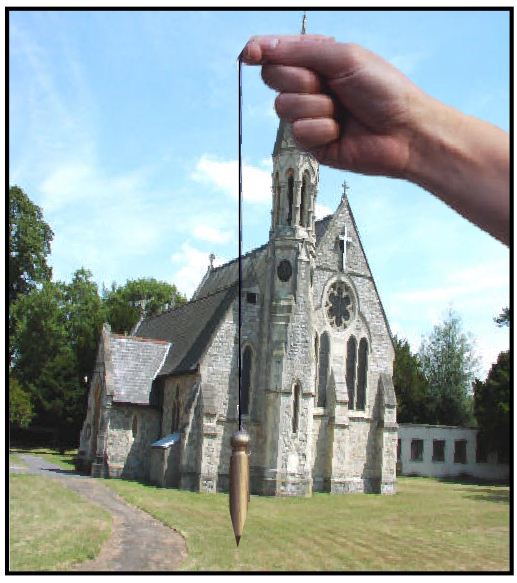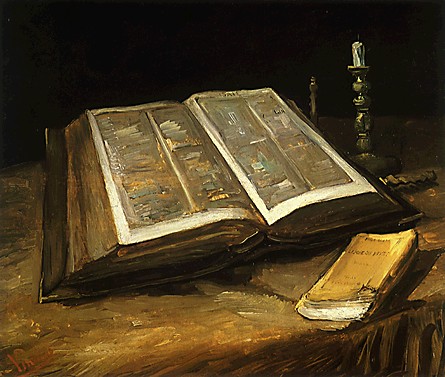I will set a Plumb Line amongst My People
When the foundations are faulty it is pointless to fiddle with the superstructure. The problem needs to identified and remedied before the building can be soundly restored.
first published 10/06/11
Thus He showed me, and behold, the Lord was standing by a vertical wall with a plumb line in His hand.
The LORD said to me, "What do you see, Amos?" And I said, "A plumb line." Then the Lord said, "Behold I am about to put a plumb line In the midst of My people Israel. I will spare them no longer.
(Amos 7:7-8)

What we are currently seeing in the Church of Scotland is the beginning of organisational collapse; but it's not just the national church.
Humanly speaking dwindling membership, plummeting income, ageing congregations, retiring ministers, and buildings that are expensive to maintain do not bode well for a healthy future.
However this is not the root of the problem. Neither is the fundamental issue any of these things.
The problem with the Church of Scotland is spiritual. But even the issue of homosexual clergy is more of a symptom than a cause.
The real spiritual problem affecting the churches is that they have departed from the biblical pattern for the body of Christ.
A Body Disabled
You also, like living stones, are being built into a spiritual house to be a holy priesthood, offering spiritual sacrifices acceptable to God through Jesus Christ. For in Scripture it says: "See, I lay a stone in Zion, a chosen and precious cornerstone, and the one who trusts in him will never be put to shame." (1 Peter 2:5-6)
The 16th-century Reformation may have corrected some very important issues, but some of the very serious errors of the pre-Reformation church were carried across and still live with us today.
One of the biggest problems within the church since the time of Constantine is the clergy/laity system which separates and distorts the body of Christ into an unbiblical bipartite division, which – to one degree or another – damages everyone; on both sides of the line.
At the time of Luther, Calvin and Knox, priests were re-named ministers. The form of address was changed from 'Father' to 'Reverend' and, in a de facto sense, the sacerdotal system of priestcraft was preserved as a distinction between the 'officer' and the 'other ranks'.
In other words, nothing really changed. (And it is important to note that neither priestly literacy in an earlier age, nor theological education through to the present day has been effective in ensuring that sound doctrine and/or practice will be maintained in the preaching and teaching of God's word.)
The making of the Christian minister into a priestly class, set apart, and possessing a priesthood different in kind from the rest of Christians disrupted the Christian community. It led to the degradation of the laity, the obscuring of the nature of Christian life and mission, the distortion of the Christian liturgy into heiratic ritual and its eventual fossilisation.... The work of Christ marked the death of all religious systems including the Jewish... Christians had a mission to go out into the world, disclosing to men the history as revealed in Christ.
To do this they were freed from the baggage of religion, empowered by their faith and the Spirit. Instead with the creation of a special priestly class possessed of hierarchical authority, Christians have built the most elaborate religious system yet seen on earth and, imprisoned by it, are now lamenting the that the course of human history has left the behind as quaint survivors of a past culture. (Let My People Grow: Michael Harper.)
The 'church' in its truest sense is all about people and nothing whatsoever to do with buildings, titles and denominations. Yet ask the average non-churchgoer to describe 'the church' and the answer will invariable centre around these facets of organised religion.
The body of Christ (in any one place) is meant to be a group of believers with a range of different giftings bestowed across the whole body, exercised by every member respectively in a collective environment of mutual support and oversight, with a servant heart and a humble spirit. This is what the priesthood of all believers essentially entails; nay, demands.
Without the concept of every-member ministry (the word ministry means 'service' and not 'office') being practised and not just preached (if, at present, it is at all) the church will continue to languish.
An Allegiance to Truth Abandoned
And even as Jannes and Jambres withstood Moses, so do these also withstand the truth. Men corrupted in mind, reprobate concerning the faith.
But they shall proceed no further. For their folly shall be evident unto all men, as theirs also came to be. (2 Tim 3:8-9)
Amongst liberal leaders, Truth has long-since been abandoned in order to marry the spirit of the age, and now even evangelicals (whatever the word now means) are – from at least some appearances – prepared to allow Truth to be sacrificed for the sake unity and/or personal security. And yet the word of God adures the disciples of Christ to 'contend earnestly for the faith which was once for all delivered unto the saints' (Jude 1:3). Surely it is time to hold high the Word of God in our nation and in our knowledge and understanding?
The problem here is (structural) unity where there should be (spiritual) division.
-------------
A Spiritual House Divided
Neither for these only do I pray, but for them also that believe on me through their word; that they may all be one; even as thou, Father, art in me, and I in thee, that they also may be in us: that the world may believe that thou didst send me. And the glory which thou hast given me I have given unto them; that they may be one, even as we are one. (John 17:20-22)
Theologically there can only be one body of Christ. In this context the Reformers wanted the one church returned to biblical form. Of course history tells us this did not happen. Indeed the chronology of ecclesiastical 'progress' from that time forward has been, and continues to be, a picture of tragic schism and division.
Whilst it is entirely proper to separate oneself from error, much of the fragmentation has come amongst those who essentially believe the same foundational truths.The rumps and splinters of our present day testify to the atomisation of the body of believers that has been the process and product of centuries.
The problem here is (structural) division where there should be (spiritual) unity.
-------------
A Theology Flawed
"Thus you nullify the word of God by your tradition that you have handed down. And you do many things like that." (Mark 7:13)
"I look on Catechisms as mere landmarks against heresey. If there had been no heresey, they wouldn't have been wanted. It's putting them out of their place to look on them as magazines of truth. There's some of your sour orthodox folk just over-ready to stretch the Bible to square with their Catechism; all very well, all very needful as a landmark, but what I say is, do not let that wretched, mutilated thing be thrown between me and the Bible."
Rev. Thomas Chalmers
speaking on the right use of Confessions of Faith.
The Scottish Reformers first codified their doctrine in the Scots Confession. (A statement which, incidentally, vilified credo/believer baptists.) This document was superceded by the Westminster Confession of Faith which – for all the good it contains – is seriously flawed by the omission of major themes (eg. the doctrine of the Holy Spirit, the Great Commission); the inclusion of man-made laws (e.g. unbiblical restrictions on the celebration of the Lord's Supper; the artificial distinction between 'teaching' and 'ruling' elders); dogmatism where conscientious differences exist (e.g. on baptism); highly-dubious statements based on skewed eschatology (e.g. reference to the Pope being the Anti-Christ); legislation on matters which are essentially of the heart (e.g. worship).
The list goes on and on. The WCF is fatally-flawed; and as such continues to cripple and unbiblically constrain the body of God's people. Who will grasp the nettle?
A Caring Compromised
For neither was there among them any that lacked: for as many as were possessors of lands or houses sold them, and brought the prices of the things that were sold, and laid them at the apostles' feet: and distribution was made unto each, according as any one had need.
(Acts 4:34-35)
Therefore, as we have opportunity, let us do good to all people, especially to those who belong to the family of believers. (Gal. 6:10)
The picture which leaps out of the holy pages of the early church illustrates a body of people caring for each other and offering mutual edification and practical support. It would be an interesting exercise to look at the financial accounts of modern-day churches and see how much of the total income is spent on supporting those who are in genuine need in contrast to 'running the great big machine'. Yet today the biblical injunction to look after fellow believers (cf Gal. 6:10)is very often being ignored with the responsibility being side-stepped and parcelled-out to the welfare state.
A Babel Built
Woe to you who add house to house and join field to field till no space is left and you live alone in the land. The LORD Almighty has declared in my hearing: "Surely the great houses will become desolate, the fine mansions left without occupants. A ten-acre vineyard will produce only a bath of wine, a homer of seed only an ephah of grain." (Isaiah 5:8-10)
"Stand at the gate of the LORD'S house and there proclaim this message: " 'Hear the word of the LORD, all you people of Judah who come through these gates to worship the LORD. This is what the LORD Almighty, the God of Israel, says: Reform your ways and your actions, and I will let you live in this place.
Do not trust in deceptive words and say, "This is the temple of the LORD, the temple of the LORD, the temple of the LORD!" (Jer. 7:2-4)
Jesus left the temple and was walking away when his disciples came up to him to call his attention to its buildings.
"Do you see all these things?" he asked. "I tell you the truth, not one stone here will be left on another; every one will be thrown down." (Matt 24:1 - 2)
Modern-day cathedral
 It has been said that it is easy to discern a man (or woman's) idol(s). How we each spend our discretionary time and money tells us where our heart lies. It is no different with organisations.
And yet in a day of crippling need around us and abroad, we see vast amounts of time, effort, energy, resources and finance being poured into buildings; and maintaining and even extending the apparatus of religious machinery and structures.
When gazing across a city skyline punctuated by church spires a young believer remarked: "It must have been great when all these churches were full." His older companion had a different view. With a wry smile he observed: "They never were (full). Each church was built to be bigger than the one next door."
-----------------------------------
A word from the Word
 AMOS - a Judean 'crofter' - was on safe ground to begin with: his messages were addressed to the surrounding nations and districts. And we can imagine his own countrymen encouraging the poor shepherd: "At-a-boy Amos. Sock it to them!" But we can also imagine the startled hush which would have fallen when he swung around to address his fellow Jews: all of them. AMOS - a Judean 'crofter' - was on safe ground to begin with: his messages were addressed to the surrounding nations and districts. And we can imagine his own countrymen encouraging the poor shepherd: "At-a-boy Amos. Sock it to them!" But we can also imagine the startled hush which would have fallen when he swung around to address his fellow Jews: all of them.
"Hear this word the Lord has spoken against you, O people of Israel - against the whole family I brought up out of Egypt: You only have I chosen of all the families of the earth; therefore I will punish you for all your sins." (Amos 3:1)
We can well imagine the stunned silence quickly turning to self-righteous outrage. "Who do you think you are Amos? You can't speak to us like that. Get back to your fields and leave the prophesying to the professionals."
In the catalogue of calamities which the Lord - in his redemptively-motivated judgement - was bringing upon them there was a repeating refrain. In the list of sins which God set before the people, each time we see the same devastating observation:
'"Yet you have not returned to me", declares the Lord.' (Amos 4: 6, 8, 9, 10, 11)
Through the prophet, God cries to His people: "Seek me that you may live."
But it would seem that the Lord's compassionate entreaty fell on proud, smug and unyielding hearts:
"Woe to you who are complacent in Zion, and to you who feel secure on Mount Samaria, you notable men of the foremost nation, to whom the people of Israel come! (Amos 6:1) The Sovereign Lord has sworn by himself - the Lord God Almighty declares: "I abhor the pride of Jacob and detest his fortresses.' (Amos 6:8).
Yet even as the judgements (Amos 7:1, 4) of God were about to fall Amos plead before the throne:
"Sovereign Lord, I beg you, stop! How can Jacob survive? He is so small!" (Amos 7:2, 5)
So twice we see Amos interceding for a stay of judgement; and twice the Lord relented and changed His mind. (Amos 7:3, 6). But then God gave Amos a picture to which the shepherder had no response: he realised that the time was up: the point of inevitability had been reached.
"Look, I am setting a plumb line among my people Israel; I will spare them no longer." (Amos 6:7)
It was at this point that Amaziah the priest could take no more: Amos had to be denouced, ridiculed, silenced and banished (Amos 7:10 - 14). But God continued to speak through his lowly but faithful servant:
"The days are coming," declares the Sovereign Lord, "when I will send a famine through the land-- not a famine of food or a thirst for water, but a famine of hearing the words of the Lord. Men will stagger from sea to sea and wander from north to east, searching for the word of the Lord, but they will not find it.' (Amos 8:11 - 12)
Yet even in all of this there is a redemptive purpose. The process on which God was engaged then is a process on which we may well find the Almighty engaged today.
"For I will give the command, and I will shake the house of Israel among all the nations as grain is shaken in a sieve, and not a pebble will reach the ground." (Amos 9:10).
Purification is God's aim; it's disobedience that brings the pain.
We see from the above verse that the shaking which God was to send as a sifting process would remove every pebble so that what would fall to the threshing floor would be pure grain.
|